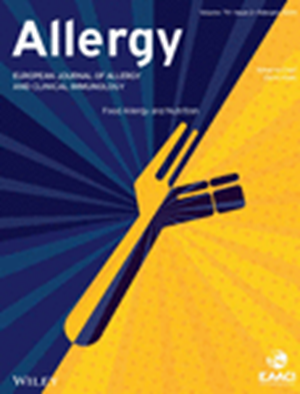Feedback regulation of VISTA and Treg by TNF‐α controls T cell responses in drug allergy
IF 12.6
1区 医学
Q1 ALLERGY
引用次数: 0
Abstract
BackgroundSevere cutaneous adverse reactions (SCARs) mediated by cytotoxic T lymphocytes are a series of life‐threatening conditions with a mortality of 4%–20%. The clinical application of tumor necrosis factor‐alpha (TNF‐α) antagonist improves the outcome of some SCARs patients; however, this is complicated by the elusive and varied immunopathogenesis.AimTo investigate whether IgE antibody responses to HEMAs are associated with AD, its severity, and response to dupilumab.MethodsTo clarify the precise process and optimize the therapy regimen of SCARs, we performed single‐cell sequencing, in vitro functional and clinical analysis of patients with SCARs.ResultsWe observed that TNF‐α breaks drug‐specific T‐cell tolerance by inhibiting the expression of V‐type immunoglobulin domain‐containing suppressor of T‐cell activation (VISTA). Furthermore, TNF‐α generated a positive feedback loop in the early phase of drug‐specific T‐cell activation, whereby B cells acted reciprocally on the corresponding T cells to reinforce TNF‐α cytokine expression. In contrast, this pathway of TNF‐α‐VISTA signaling did not operate in memory effector T cells. Drug‐specific memory effector T‐cell responses were inhibited by increasing Treg cell expression in a negative feedback loop, with TNF‐α antagonists preventing the inhibitory effect. These observations align with the clinical analysis that early but not late intervention with TNF‐α antagonists significantly improved outcomes in SCARs patients.ConclusionOur findings defining feedback regulation of VISTA and Treg cells by TNF‐α in different stages of the drug‐specific T‐cell response and, indicate that a Treg agonists, instead of TNF‐α antagonists, could be used for treatment of patients with progressive SCARs.TNF-α 对 VISTA 和 Treg 的反馈调节控制着药物过敏中的 T 细胞反应
背景由细胞毒性T淋巴细胞介导的严重皮肤不良反应(SCARs)是一系列危及生命的疾病,死亡率为4%-20%。肿瘤坏死因子-α(TNF-α)拮抗剂的临床应用改善了一些 SCARs 患者的预后;然而,难以捉摸且多种多样的免疫发病机制使情况变得复杂。结果我们观察到,TNF-α通过抑制含V型免疫球蛋白结构域的T细胞活化抑制因子(VISTA)的表达,打破了药物特异性T细胞耐受。此外,TNF-α在药物特异性T细胞活化的早期阶段产生了一个正反馈回路,B细胞对相应的T细胞产生互作作用,加强了TNF-α细胞因子的表达。与此相反,TNF-α-VISTA 信号传导的这一途径在记忆效应 T 细胞中不起作用。药物特异性记忆效应T细胞反应在负反馈循环中通过增加Treg细胞的表达而受到抑制,TNF-α拮抗剂阻止了这种抑制作用。这些观察结果与临床分析结果一致,即使用 TNF-α 拮抗剂进行早期干预能显著改善 SCARs 患者的预后,而使用 TNF-α 拮抗剂进行后期干预则不然。
本文章由计算机程序翻译,如有差异,请以英文原文为准。
求助全文
约1分钟内获得全文
求助全文
来源期刊

Allergy
医学-过敏
CiteScore
26.10
自引率
9.70%
发文量
393
审稿时长
2 months
期刊介绍:
Allergy is an international and multidisciplinary journal that aims to advance, impact, and communicate all aspects of the discipline of Allergy/Immunology. It publishes original articles, reviews, position papers, guidelines, editorials, news and commentaries, letters to the editors, and correspondences. The journal accepts articles based on their scientific merit and quality.
Allergy seeks to maintain contact between basic and clinical Allergy/Immunology and encourages contributions from contributors and readers from all countries. In addition to its publication, Allergy also provides abstracting and indexing information. Some of the databases that include Allergy abstracts are Abstracts on Hygiene & Communicable Disease, Academic Search Alumni Edition, AgBiotech News & Information, AGRICOLA Database, Biological Abstracts, PubMed Dietary Supplement Subset, and Global Health, among others.
 求助内容:
求助内容: 应助结果提醒方式:
应助结果提醒方式:


